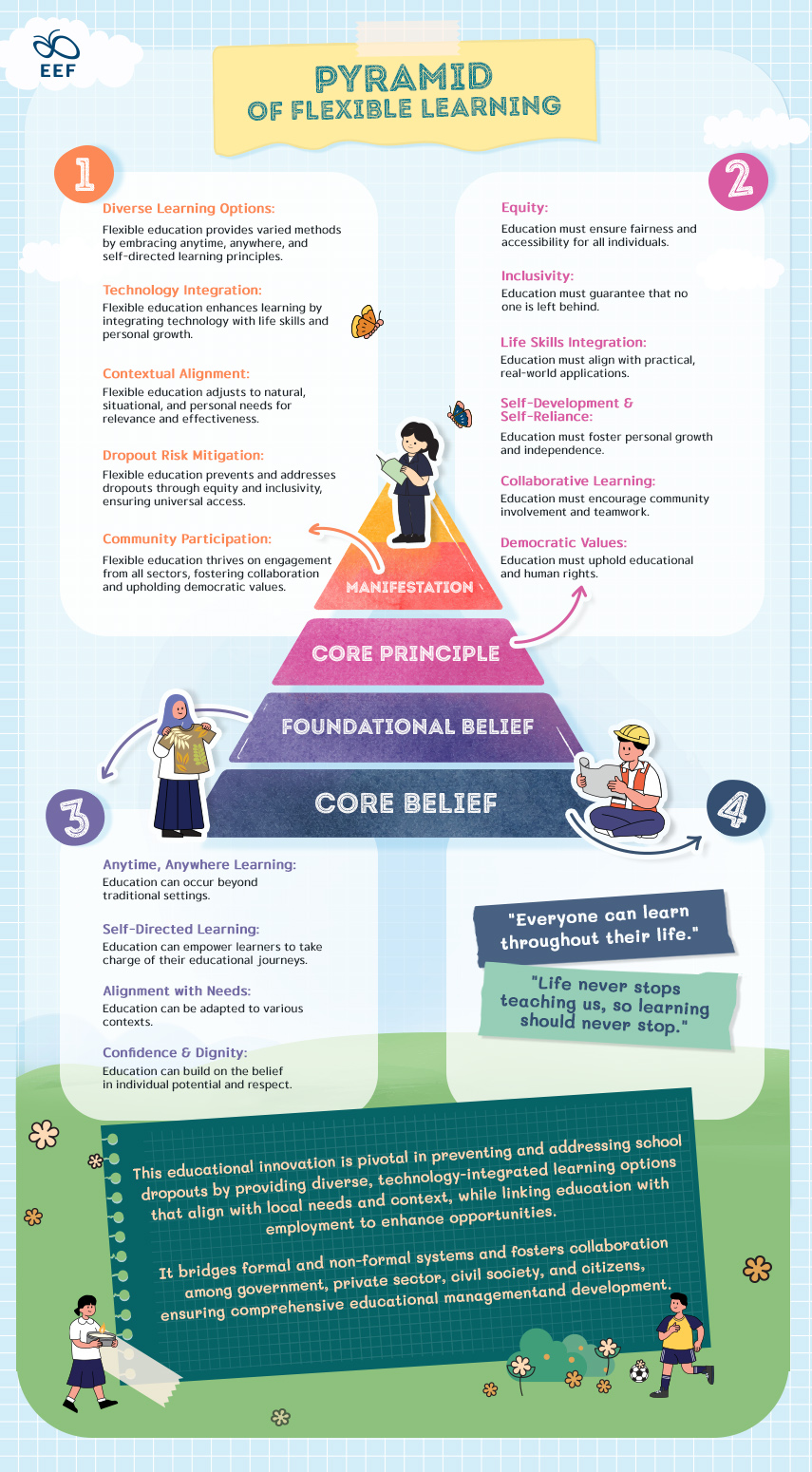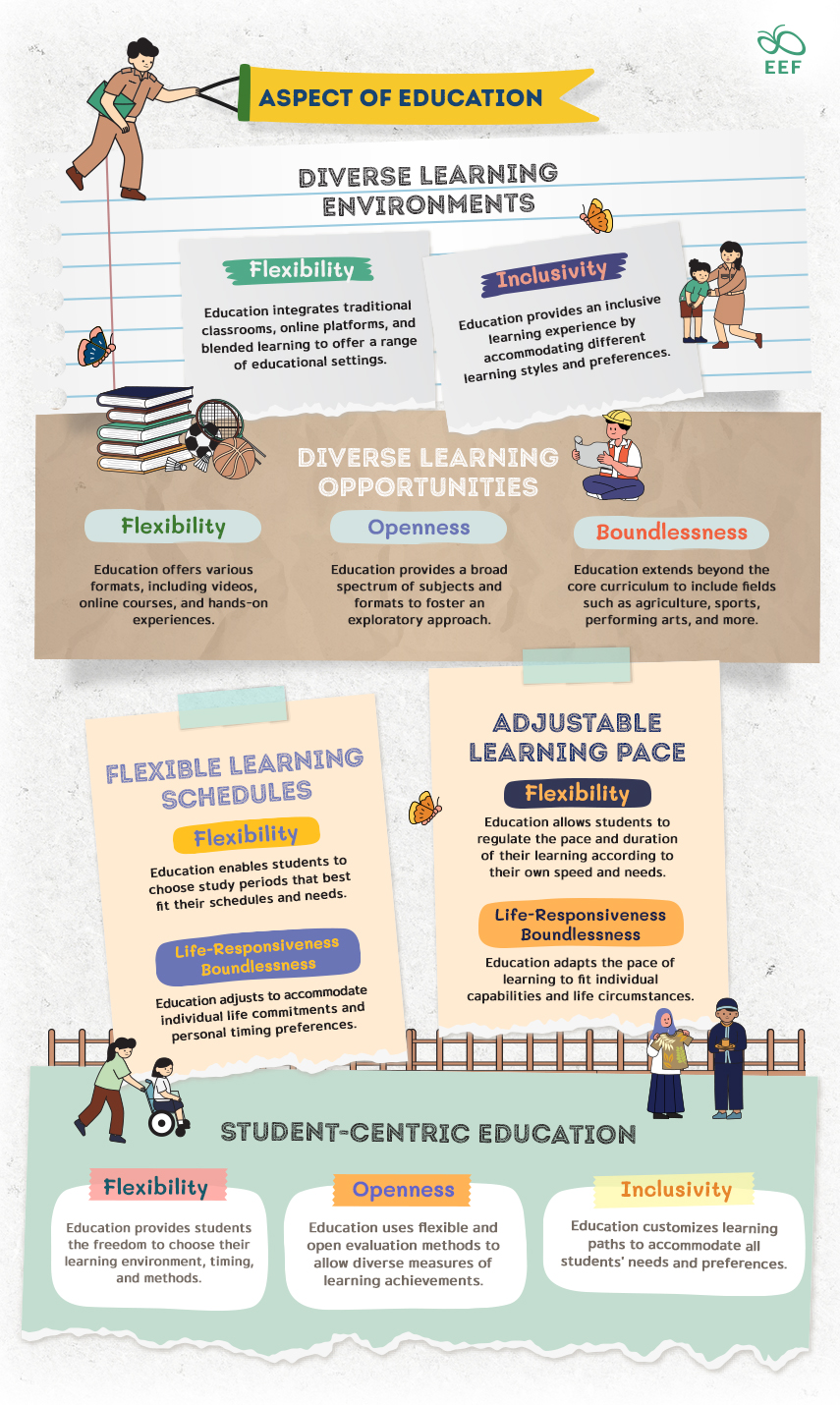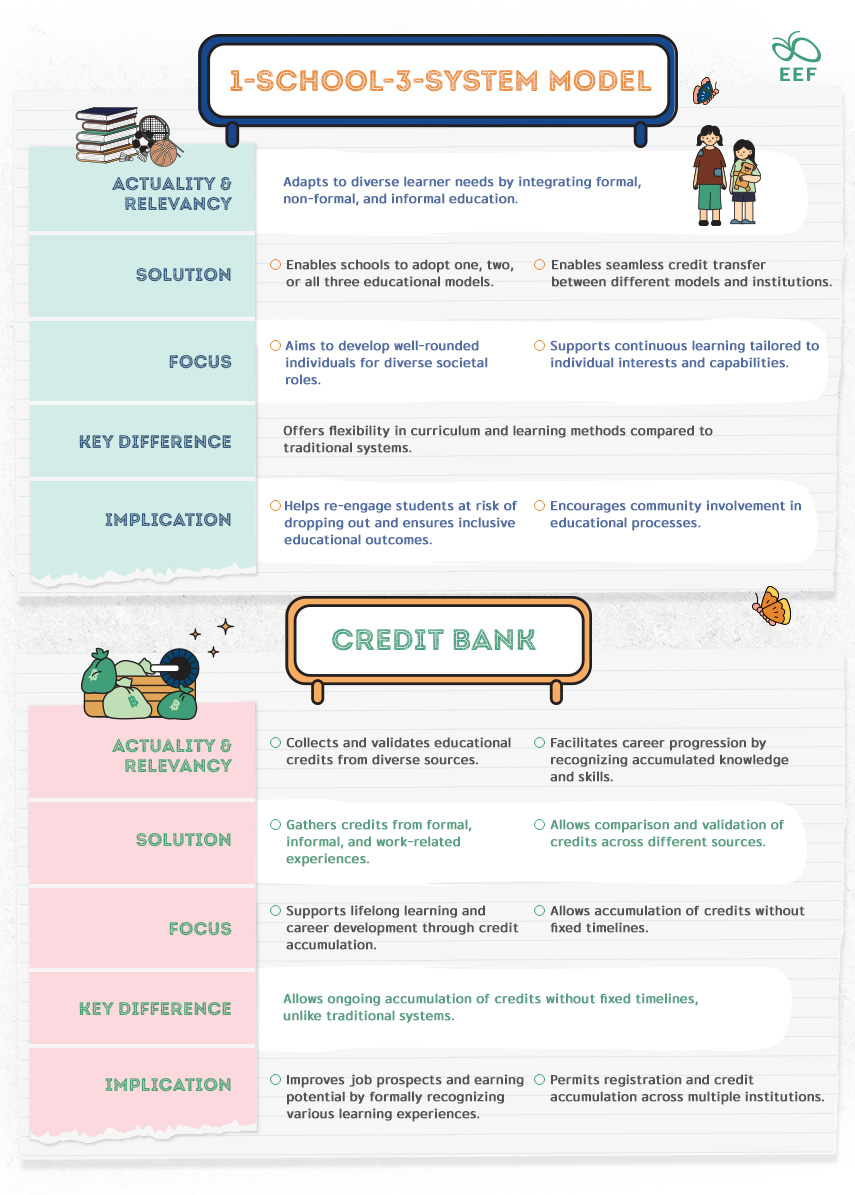
Opening doors to opportunities through educational innovation — imperative for Thailand’s severe educational crisis — demands flexibility and responsiveness for all children and youth. With over 2.8 million at risk of dropping out, an additional 1.02 million already having left, and more than 1.4 million youths aged 15 to 24 classified as NEET (Not in Employment, Education, or Training), the country confronts a critical issue. The urgent need for reintegration strategies highlights the impact on current and future national development, compounded by the aging society and declining birth rates that have ensnared Thailand in the middle-income trap for the past 30 years. Thus, effective measures adapting to diverse needs must offer varied educational options tailored to individual potential, readiness, and aptitudes.

Flexible Learning, manifested through formal, alternative, non-formal, and informal education, must be grounded in principles that accommodate learner-driven education. Integrating technology enhances this philosophy, blending life skills with personal growth and ensuring contextual alignment with natural, situational, and individual requirements for relevancy and effectiveness. Addressing dropout risks through equity and inclusivity guarantees universal access, while community participation fosters collaboration and supports democratic values. Central to this dynamic paradigm is equity, which ensures fairness and accessibility, and inclusivity, which prevents exclusion. Life skills integration aligns education with practical applications, while self-development promotes independence. Community involvement supports collaborative learning and reinforces democratic values and educational rights. Foundational beliefs affirm that education transcends traditional settings, empowering learners through self-directed journeys that can occur anytime and anywhere and are adaptable to various contexts, encapsulating the enduring nature of learning with the conviction that “everyone can learn throughout their life” and “life never stops teaching us, so learning should never stop.”
Pyramid of Flexible Learning

Manifestation
- Diverse Learning Options: Flexible education provides varied methods by embracing anytime, anywhere, and self-directed learning principles.
- Technology Integration: Flexible education enhances learning by integrating technology with life skills and personal growth.
- Contextual Alignment: Flexible education adjusts to natural, situational, and personal needs for relevance and effectiveness.
- Dropout Risk Mitigation: Flexible education prevents and addresses dropouts through equity and inclusivity, ensuring universal access.
- Community Participation: Flexible education thrives on engagement from all sectors, fostering collaboration and upholding democratic values.
Core Principle
- Equity: Education must ensure fairness and accessibility for all individuals.
- Inclusivity: Education must guarantee that no one is left behind.
- Life Skills Integration: Education must align with practical, real-world applications.
- Self-Development & Self-Reliance: Education must foster personal growth and independence.
- Collaborative Learning: Education must encourage community involvement and teamwork.
- Democratic Values: Education must uphold educational and human rights.
Foundational Belief
- Anytime, Anywhere Learning: Education can occur beyond traditional settings.
- Self-Directed Learning: Education can empower learners to take charge of their educational journeys.
- Alignment with Needs: Education can be adapted to various contexts.
- Confidence & Dignity: Education can build on the belief in individual potential and respect.
Core Belief
- “Everyone can learn throughout their life.”
- “Life never stops teaching us, so learning should never stop.”

To illustrate Thailand’s educational transformation, one must examine its innovative solutions that address diverse learning needs and career development. Central to these transformative efforts are the 1-School-3-Models Model and the Credit Bank, paving the way for progressive educational reforms. The 1-School-3-Models seamlessly integrates formal, non-formal, and informal education into a cohesive framework, enabling schools to adopt one, two, or all three models. Through this integration, smooth credit transfers are facilitated, supporting continuous and personalized learning. Cultivating well-rounded individuals, this model re-engages students at risk of dropping out and fosters inclusivity by involving the community actively. Parallel to this, the Credit Bank revolutionizes career advancement, validating and accumulating credits from formal, informal, and work-related experiences. Unlike conventional systems, it offers flexibility with no fixed timelines for credit accumulation, enhancing lifelong learning and improving job prospects and earning potential through formal recognition of diverse learning experiences. By supporting ongoing credit registration and accumulation across multiple institutions, both initiatives together represent a dynamic shift towards more adaptable and inclusive educational and career pathways, signifying a profound transformation in Thailand’s approach to education and employment development.

This educational innovation is pivotal in preventing and addressing school dropouts by providing diverse, technology-integrated learning options that align with local needs and context, while linking education with employment to enhance opportunities. It bridges formal and non-formal systems and fosters collaboration among government, private sector, civil society, and citizens, ensuring comprehensive educational management and development.
Considering the influence of various factors on children’s and youths’ lives, it becomes clear that their educational opportunities must reflect their unique contexts. Influences such as family dynamics, social issues, economic conditions, job-oriented relocations, and health concerns shape their experiences, revealing the need for a supportive and adaptable educational ecosystem for unlocking potential and ensuring stability and quality for every child. Traditional models, which often fall short, require the embrace of flexible, tailored approaches to address varied needs. Education must transcend conventional settings, embodying a holistic view of learning as a lifelong process. Facilitated by flexibility and inclusivity, as advocated by the UN, education evolves beyond administration to truly meet the demands of modern learning environments; it thrives on the integration of traditional classrooms, online platforms, and blended approaches, creating diverse learning environments. By accommodating various learning styles and preferences, education ensures an inclusive experience. Spanning videos, online courses, and hands-on experiences, education extends beyond core curricula into fields like agriculture, sports, and performing arts. With adjustable learning schedules, education aligns study periods with students’ lives and preferences. Furthermore, allowing students to regulate their learning pace according to personal needs and capabilities, education empowers learners through a student-centric approach. By offering flexible evaluation methods to accommodate a broad spectrum of achievements, education customizes learning paths, reflecting its commitment to adaptability and inclusivity.

Given the significant labor demand projections for 2021 to 2025, where the industrial sector requires 564,176 workers — with 53.6% needing specialized skills — it becomes evident that addressing educational disparities is crucial. With only 27% accessing higher secondary education and a mere 7% pursuing further studies, emerging as a pragmatic solution is vocational training. This pathway not only addresses educational and economic inequalities but also equips students with targeted skills, enhancing job prospects and mitigating poverty risk. By offering structured routes from vocational certificates to higher education, vocational education ensures both career readiness and economic mobility. Vocational scholarships further support this effort by bridging financial gaps, reducing dropout rates, and aiding youth aged 15-24. Aligning vocational programs with Thailand’s economic priorities — such as next-generation automotive and biotechnology — strengthens the connection between education and market demands, reinforcing economic sustainability. Concurrently, enhancing institutional quality through improved curricula and facilities ensures that graduates meet industry standards, while academic and administrative support systems foster student success by overcoming barriers to progression. These initiatives not only prepare students for meaningful careers but also drive economic advancement and reduce inequalities.

The future of learning is being reshaped by a global expansion of educational access, enabling diverse learners to engage with a wealth of online platforms that offer vital resources for upskilling and reskilling. As systemic and external barriers — such as rigid curricula, lack of resources, geographical isolation, and technological limitations — are being dismantled, education evolves to ensure that every child can achieve at least a Grade 9 equivalent qualification through personalized learning paths. Freed from traditional constraints, students are no longer confined to physical schools; instead, they become their own educators, viewing every moment as a chance to learn. Growth is fostered through expert-led short courses and local business support, with a focus on student happiness and the integration of soft skills. Meanwhile, innovative solutions like Learning Coin and Mobile School are pivotal in addressing educational inequities. Learning Coin combats disparities by providing tablets loaded with the “Learn Big” app, which features over 1,000 resources and skill tracking, alongside scholarships for reading achievements, specifically targeting at-risk children, including those with disabilities. In parallel, Mobile School transforms education for out-of-school children and youth and those in juvenile detention by leveraging mobile platforms such as Facebook, TikTok, Line, and Google Classroom. This approach shifts education from traditional classrooms to mobile, personalized environments, emphasizing practical knowledge and self-directed learning. Through these advancements, both initiatives enhance inclusivity and accessibility, empowering students to shape their learning journeys and improve their life outcomes.
In conclusion, tackling Thailand’s educational crisis requires a comprehensive approach that emphasizes flexibility and inclusivity, ensuring that all children and youth have access to quality learning opportunities — a mission perfectly encapsulated by the Equitable Education Fund (EEF) Thailand, which aims to reduce education inequality through research, collaboration, and support for children, youth, and adults in need. Innovative frameworks such as the 1-School-3-System Model and the Credit Bank demonstrate how the integration of formal, non-formal, and informal education can create tailored pathways for students, especially those at risk of dropping out. Additionally, vocational education initiatives aligned with national economic goals equip young people with essential skills to thrive in a rapidly changing job market. Digital tools like Learning Coin and Mobile School further revolutionize traditional educational barriers, empowering learners through personalized, self-directed growth. By promoting collaboration among various stakeholders, including government, private sectors, and communities, Thailand is poised to bridge educational disparities and enhance career prospects, ultimately driving socio-economic development. Furthermore, as Thailand navigates the intricacies of modern education, the adoption of technology and the encouragement of self-directed learning are vital for developing a responsive educational ecosystem. By catering to diverse learning styles and personalizing educational experiences, the nation can foster an environment where lifelong learning can thrive. This commitment to equity, inclusivity, and collaboration not only equips students for future challenges but also reinforces the notion that education is an ongoing journey. By nurturing a culture of continuous growth and development, Thailand can unlock the full potential of its youth, enabling them to make meaningful contributions to society and the economy while breaking the cycle of poverty and inequality.

